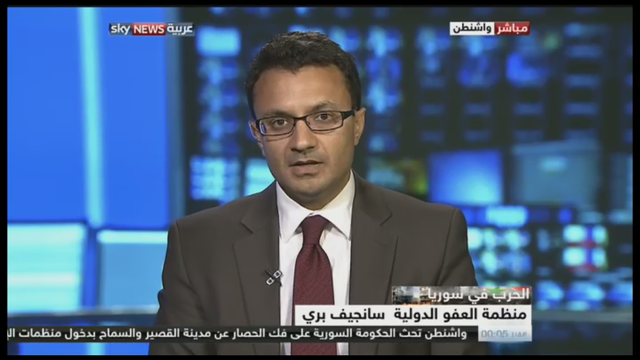Yesterday, I joined the team at Sky News Arabia for a live discussion of the latest report on Syria by an independent UN panel. Special thanks to Sky News producer Arwa Sawan, reporter Joseph Khawly, and anchor Amer Abdel Aziz for giving Amnesty International USA an opportunity to share our analysis of the grave human rights situation.
The report (PDF) is a catalog of violence, suffering, and geopolitical developments, focusing on events between January 15th and May 15th of this year. It was produced by the Independent International Commission of Inquiry on the Syrian Arab Republic, established by the UN Human Rights Council in 2011.
Here are some key excerpts:
- Crimes against humanity: Government forces and affiliated militia have committed many human rights violations that were “perpetrated as part of widespread or systematic attacks against civilian populations and constitute crimes against humanity.” According to the Commission, these violations have included “murder, torture, rape, forcible displacement, enforced disappearance, and other inhumane acts.”
- War crimes: Both government forces and affiliated militia, as well as anti-government armed groups, have committed war crimes. With regards to anti-government groups, these war crimes include “murder, sentencing and execution without due process, torture, hostage-taking and pillage.”
- Difference in scale: “The violations and abuses committed by anti-Government armed groups did not, however, reach the intensity and scale of those committed by Government forces and affiliated militia.” (Amnesty International’s own research supports this conclusion, though our research also points to an escalation in abuses by armed opposition groups.)
- Chemical weapons: “There are reasonable grounds to believe that chemical agents have been used as weapons. The precise agents, delivery systems or perpetrators could not be identified.”
The humanitarian context:
- 1.6 million Syrians have become refugees.
- 4.25 million Syrians are internally displaced.
- 6.8 million people are in need of urgent assistance, half of whom are children. They include people “trapped in conflict-affected and opposition-held areas,” as well as “refugees in neighboring countries.”
The military context:
- “Excepting Al-Raqqah, the Government has held all major cities despite facing serious challenges in Aleppo, Dara’a and Dayr Al-Zawr.”
- “Anti-Government armed groups have reinforced their control over regions seized in northern and eastern governorates, but failed to push further into the key areas of Damascus, Aleppo and Homs.”
Lack of access to Syria:
- The Syrian government has repeatedly ignored requests from the Commission for access to the country.
- As a consequence, the Commission’s report is based on “430 interviews conducted in the region and from Geneva, including via Skype and telephone with victims and witnesses inside the country.” The report also relied on photographs, video recordings, satellite imagery and medical records.
The news from the Commission is just further evidence of the need for the UN Security Council to refer the situation to the International Criminal Court. Our own Middle East and North Africa Program Director, Philip Luther, put it bluntly: “How many more reports need to be published on Syria for the world to wake up and take action to stop the bloodshed of civilians?”

I wonder where d UN focus should be by now. This is a crisis that is standing for two yrs or there about and yet the UN standing on the principles of world peace and security couldn’t make a tangible move. I hope this won’t end up like the Rwandan story for the UN
I am in U.S. How can U.S. tell Turkey government anything, or Assad regime, or Syrians, or Israeli/Netanyahu (border settlements/human rights violations, e.g.) anything ?
"Power" seems to speak through military strength.
Can our petitions, in massive human rights violations, make a difference? I think it requires sometimes something different, in cases of civil wars, repressive regimes. Boycotts, sanctions, CAN work to a point, but not in all cases.
What can the U.N. do in case of Syria? The U.S. and other countries need to start backing the U.N. for real! Assist in every possible way, back them, and work along side them.
Let the U.N. be a major ASSET, not peripheral – and accord it financial backing and full support it needs.
U.N. leader Ban Ki-moon said that it would not be helpful to arm either side, and for" U.S. to send weapons to rebels in Syria, without on-the-ground investigation (chemical weapons use), and evidence of chain of command." That was last week.
I feel how this awful bloodshed should have been stopped from the beginning. The different political interests are the problem. SAVE THE PEOPLE!
It's obvious that the UN is not delighted about what happens in syria right now… but the thing is, they have almost no power compared to the us….